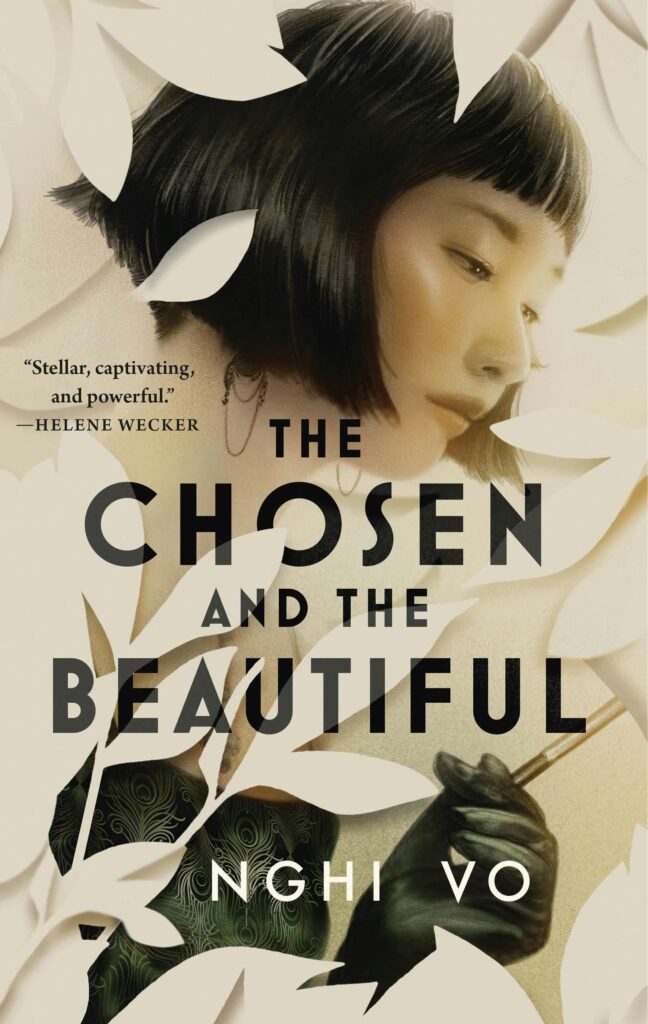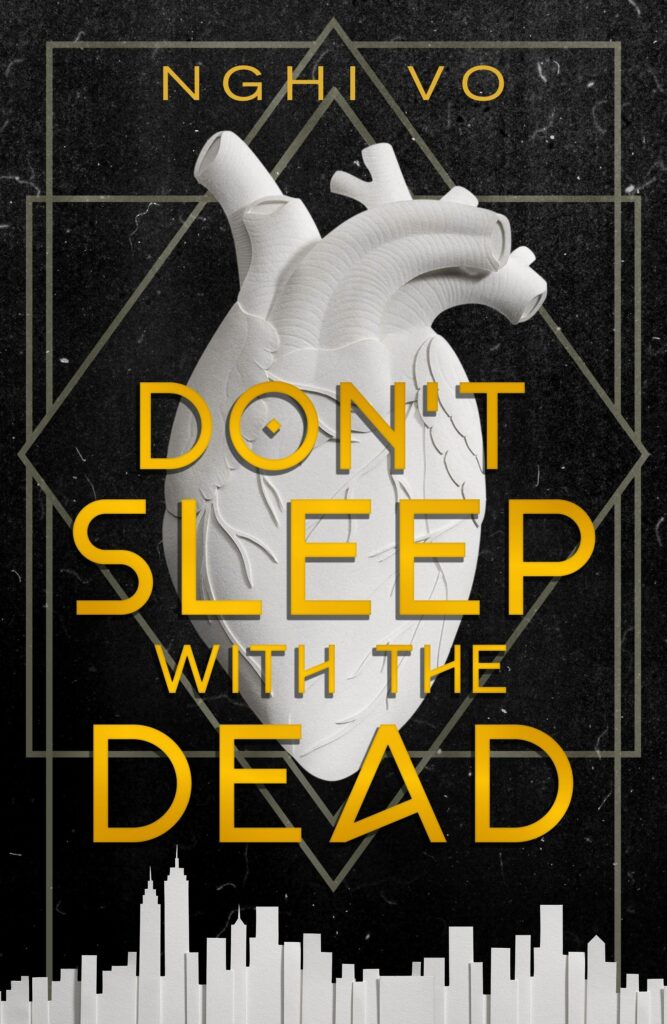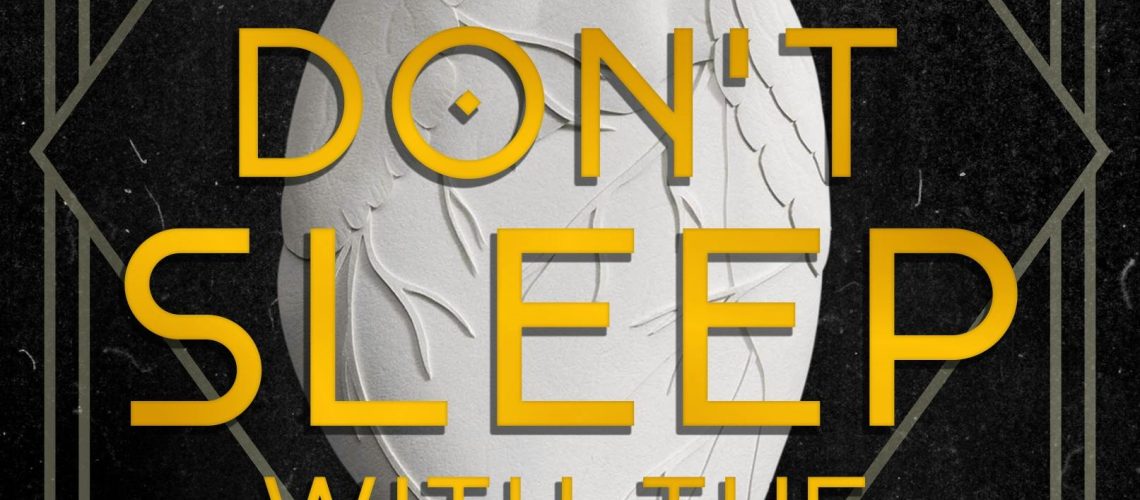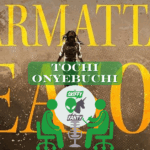I was intrigued to find out that Nghi Vo has reinterpreted F. Scott Fitzgerald’s literary classic The Great Gatsby (1925). After hearing about her novella Don’t Sleep with the Dead, I checked and was disappointed to see that I had actually missed the first book in this queer fantasy duology, The Chosen and the Beautiful, when it was published in 2021. Now I’ve read them both; I am amazed, and I want to tell everyone how great they are.
I’ve been enjoying Nghi Vo’s Singing Hills Cycle, an award-winning Asian historical fantasy series that started with The Empress of Salt and Fortune in 2020, but with her first full novel, The Chosen and the Beautiful, I really feel that she has leveled up her craft. The writing is gorgeous and rich, the characterization is deep and deeply sympathetic, the fantasy elements expand the story instead of just decorating it, and various plot elements provide social commentary on The Great Gatsby, culture then, and life now. I’m a little surprised that it doesn’t seem to have been nominated for any major awards, although it was named a Best of the Year Pick by NPR and a Best Fantasy Novel from the Last 10 Years by Book Riot. Maybe readers then dismissed it from awards consideration because they considered it mere Gatsby fanfiction?
Speaking of unfair dismissals, The Great Gatsby itself has been a hot topic lately. Careless People: A Cautionary Tale of Power, Greed, and Lost Idealism, the “explosive memoir” by Sarah Wynn-Williams, takes the first two words of its title from a sentence in The Great Gatsby:
They were careless people, Tom and Daisy—they smashed up things and creatures and then retreated back into their money or their vast carelessness, or whatever it was that kept them together, and let other people clean up the mess they had made.
It’s about her years working for Facebook and her disillusionment with what she came to see as the company’s reckless disregard for factuality and societal harms. Facebook has successfully blocked Wynn-Williams from promoting her book, due to a non-disparagement clause, and allegedly tried to discourage at least one reviewer at a major news outlet from covering it. Although the Streisand effect has helped send it to the top of best-seller lists, Facebook’s defenders have assailed the author and say the book is full of errors. (I have no idea about the details, but it seems likely that the tone of the book is not too far off.)
Oddly, this vitriol has even spilled over onto The Great Gatsby itself, with a prominent person on social media recently saying that Fitzgerald’s novel is overrated as literature and no longer relevant to high school readers, who have commonly been assigned it since it gained popularity during World War II and afterwards. A lot of people whom I respect have quoted this statement in order to disparage it. I won’t bother to recapitulate arguments for and against its literary merits, and it’s indeed a period piece from a century ago (moreover, F. Scott’s treatment of his wife Zelda appalls me), but I will say that claiming the novel is irrelevant to today’s youth is ridiculous. The themes of The American Dream, class mobility (or the lack thereof), gender roles, sexuality, and racism and nationalism are all still extremely relevant these days, and some of them are even more hotly debated now than when I was in school.

The Chosen and the Beautiful is set in the same Jazz Age period, except it adds magic and devils and is told from the perspective of TGG minor character Jordan Baker (Asian here, instead of white) instead of the oddly passive Nick Carraway. (MILD SPOILER for The Chosen and the Beautiful: Did you ever wonder, when reading The Great Gatsby, why the narrator, Nick Carraway, is so detached, mostly a mere observer of events? In The Chosen and the Beautiful, Jordan Baker eventually figures out that there are magical/metaphysical reasons for this, and she uses her powers to try to help him.)
In both books, the narrators are outsiders of sorts: Nick Carraway in TGG is a Midwesterner visiting relatives in Long Island, and Jordan Baker in TCaTB is a female pro golfer. Additionally, in TGG, it’s hinted that each is ambiguously sexual, but in TCaTB their queerness is stated outright, with Nick and Jordan occasionally taking both male and female lovers (as well as each other, as shown in some extremely steamy passages). Finally, in TCaTB, Jordan is a Vietnamese “adoptee” by her former missionary parents the Bakers (apparently without benefit of paperwork), and this makes her situation especially precarious. While Daisy’s husband, Tom, praises his and his peers’ Nordic ancestry and decries immigration (as he does to a briefer extent in TGG, basically as a demonstration of his self-justifying boorishness), he and his wife assure Jordan that as their friend, she doesn’t have to worry about stricter legislation coming through, but she can see the writing on the wall and worries about being dependent upon the good graces of her friends/patrons. I don’t believe I need to belabor why this theme is especially relevant now.
I mentioned before that both The Chosen and the Beautiful and Don’t Sleep with the Dead include magic and devils, and they are far from set dressing. It’s fairly incidental that cities use magic for streetlights, for example, but more importantly, in TCaTB, Jordan and Daisy are linked partly through their experiences growing up together, which include Jordan’s using her heritage of paper-cutting magic as childish entertainment and later to help cope with an extremely difficult social crisis.
“Daisy’s soft voice in my ear sent shivers down my spine. She told me how good and clever I was, how absolutely sweet it was that I was doing this for her… With Daisy’s certainty, there was no room for my own doubt, so I simply packed it into a box and left it by the door for some other unfortunate person to pick up.”
Also crucial in this duology is the fantasy element of the existence of devils, and not just because people add drops of infernal beings’ blood to their drinks to consume demoniac instead of absinthe, or rent out their bodies for possession. The Great Gatsby includes assumptions and implications about Jay Gatsby having shot up from rags to riches at least partly via criminal connections, in order to finally (try to) win back his lost love Daisy; in The Chosen and the Beautiful, the generally accepted rumor is that Gatsby actually sold his soul, and hosts wild parties where devils can rub shoulders with other potential victims, in order to achieve wealth and success and, hopefully, Daisy.
“At Gatsby’s the clock [always] stood at just five shy of midnight the moment you arrived. Crossing from the main road through the gates of his world, a chill swirled around you, the stars came out, and a moon rose up out of the Sound. It was as round as a golden coin, and so close you could bite it. I had never seen a moon like that before… Everything was dripping with money and magic, to the point where no one questioned the light that flooded the house … The light had a particularly honey-like quality, something like summer in a half-remembered garden…”
— The Chosen and the Beautiful
The prose here is always well chosen and often gorgeous. It’s rich and transportingly lovely in some places, dry and snide in others, and occasionally delivers gut punches:
“Daisy, as pretty as she was, was never sweet either, though she sparkled so bright it was easy to think she was. It was easy to think that Daisy was many things.”
— The Chosen and the Beautiful

Don’t Sleep with the Dead takes place years after the events of The Chosen and the Beautiful. This novella is told from the perspective of Nick Carraway; we only hear from Jordan via a couple of overseas calls, when she reluctantly disburses caustic advice to her former lover and protégé. War is again looming in Europe, but that doesn’t matters nearly as much to Americans as the Great Depression, still hitting hard. Nick has written a few novels, including one about the summer of Gatsby, although Jordan says he left a lot out; he lives off inheritance and royalties, and as a newspaper columnist talking about NYC nightlife.
When this tale opens, Nick is caught up in a late-night scrum in a park where police are rounding up, beating, and arresting homosexuals, when suddenly he is rescued by someone he can’t see clearly in the dark; however, the voice of the helpful person calling him “old sport” is very familiar. After that, Nick becomes obsessed with finding out whether his old flame Gatsby could possibly have escaped from Hell, as a ghost or however else, after his death more than a decade ago. He wanders the mean streets, visits luxe clubs and other locales, has conversations with various dubious and dangerous personalities, delves into his own past, and has some extremely unsettling revelations about his progenitor. Ultimately, Nick makes a desperate decision, staking everything to gain … what? I won’t spoil that, but in the end, I absolutely love how everything turns out.
Along the way, the worldbuilding is expanded in fascinating ways, and, Nick being Nick, there are numerous moody monologues. I didn’t seek permission to quote from the eARC of Don’t Sleep with the Dead, but it too delivers some prose that make me sigh with delight and envy, as well as some passages that are harrowing with their intensity and dread. Nghi Vo’s Singing Hills Cycle makes for some very pleasant and interesting reading, but I can’t remember being wowed by those novellas the way I have been so often by this duology, via its brilliant and brutal prose, its complex characters, their actions, their arcs, and the insightful social commentary all along the way.
It’s probably possible to understand Don’t Sleep with the Dead without having read The Chosen and the Beautiful, but the revelations about Nick’s past will become much clearer by having read more about Nick’s nature in the first book. If you haven’t read either, I highly recommend getting both, if all this sounds anything like your sort of thing. (You likely don’t really need to read F. Scott Fitzgerald’s The Great Gatsby beforehand, but it helps, and you’ll probably appreciate The Chosen and the Beautiful even more if you do.)
Don’t Sleep with the Dead, by Nghi Vo, is being released April 8 by MacMillan Publishers.
Content warnings: Bloody murder, police brutality against homosexuals, blackmail, deals with devils, occasional steamy sex scenes, and references to past sex-related crimes.
Comps: Even Though I Knew the End, by C.L. Polk. If you loved that novella like I did, you’ll probably love this duology.
Disclaimers: I received a free eARC of Don’t Sleep with the Dead from MacMillan via NetGalley. (I borrowed The Chosen and the Beautiful from my library via Libby.)








2 Responses
I’m also surprised it wasn’t up for more major awards. Do you think the blend of literary and speculative elements made it tricky to classify for voters? It feels like one of those books that quietly reshapes how we think about genre fiction.
As you say, The Chosen and the Beautiful may have been hard for voters to classify so they didn’t nominate it. I don’t know about other awards, but I just looked up the 2022 Hugo Awards longlist (for 2021 books) at chrome-extension://efaidnbmnnnibpcajpcglclefindmkaj/https://www.thehugoawards.org/content/pdf/2022-Hugo-Award-Details-Final.pdf and didn’t see it among the top 16 novels listed there. So it wasn’t even close.
Also, I’m afraid many people may have just thought “this is just a reinterpretation of Gatsby” and dismissed it from awards consideration, and certainly it takes inspiration from it and revisits plot, character, and some themes, but it’s so much more than that, with considerations of backstory, heritage, and gender power imbalance, leaving aside the fantasy elements! I didn’t know about the book when it came out, or I certainly would have thought seriously about nominating it.